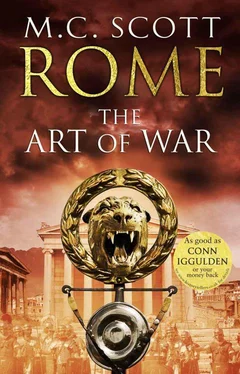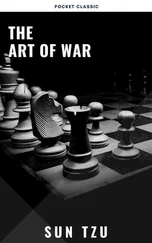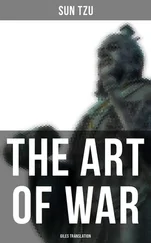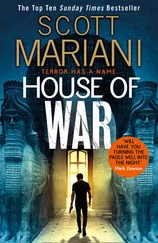M. Scott - The Art of War
Здесь есть возможность читать онлайн «M. Scott - The Art of War» весь текст электронной книги совершенно бесплатно (целиком полную версию без сокращений). В некоторых случаях можно слушать аудио, скачать через торрент в формате fb2 и присутствует краткое содержание. Жанр: Исторические приключения, на английском языке. Описание произведения, (предисловие) а так же отзывы посетителей доступны на портале библиотеки ЛибКат.
- Название:The Art of War
- Автор:
- Жанр:
- Год:неизвестен
- ISBN:нет данных
- Рейтинг книги:3 / 5. Голосов: 1
-
Избранное:Добавить в избранное
- Отзывы:
-
Ваша оценка:
- 60
- 1
- 2
- 3
- 4
- 5
The Art of War: краткое содержание, описание и аннотация
Предлагаем к чтению аннотацию, описание, краткое содержание или предисловие (зависит от того, что написал сам автор книги «The Art of War»). Если вы не нашли необходимую информацию о книге — напишите в комментариях, мы постараемся отыскать её.
The Art of War — читать онлайн бесплатно полную книгу (весь текст) целиком
Ниже представлен текст книги, разбитый по страницам. Система сохранения места последней прочитанной страницы, позволяет с удобством читать онлайн бесплатно книгу «The Art of War», без необходимости каждый раз заново искать на чём Вы остановились. Поставьте закладку, и сможете в любой момент перейти на страницу, на которой закончили чтение.
Интервал:
Закладка:
‘Yes, lord.’
‘Then go. Pantera’s ship docked at Ravenna last night. When we know where he’s going, you will be informed. You may choose two or three good men to accompany you, but you will be circumspect in what you tell them. It goes without saying that this conversation has not happened. Do you understand?’
‘Lord.’
I backed out of the doorway, bowing as much to hide the sweat on my face as out of respect for the two men inside.
That was the night before the lottery. I had lain awake through the hours of darkness wondering how they were going to rig it so that I chose Pantera’s name and by noon I had found out — and I dared not speak of it to Juvens, who had just drawn the name of the man most revered in all the legions.
Everyone has heard of Trabo, tribune of the Guard, but I can perhaps give you a soldier’s perspective. What marked him out was that he was one of us; an ordinary soldier who became extraordinary.
He didn’t come from a senatorial family. His father was barely an equestrian, although he had been a centurion with the VIth, and there was a great-grandfather back somewhere down the line who’d won a neck ring for valour serving under Marc Antony in the wars of the Triumvirate, but that was it.
Trabo joined up at eighteen and from the start he was… you’d want to say unique, but the point is that he wasn’t. He was one of us but he was just that little bit better than all of us at everything.
He could run a little faster, jump that hand or two higher, fight harder. When we put on displays for the generals, his javelin was the one that flew farthest and hit the mark most cleanly. If he’d lived in the old days of Greece, he’d have been an Olympian. In the legions he won silver to put on his belt or about his neck or on his arms, and by his mid-twenties he’d won pretty much every award there was to win and was heading up the ranks.
He made centurion at the ridiculously young age of twenty-five and nobody thought it was ridiculous in his case. He was promoted to the Guard at thirty, which was almost unheard of, but nobody begrudged him his place; he was Roman, you see, and that mattered. I’m Roman, too, but half of my men are Rhinelanders. It wasn’t right, making them Guards.
But that’s a different story. Trabo rose up the Guard ladder in the same way he’d risen up the legionary one and he was a tribune by thirty-five; the youngest for generations, perhaps the youngest ever. He was fiercely loyal to Nero and men said he wept when the boy stabbed himself in the throat. Then Galba took Nero’s Guard as his own when he took the throne, and by all accounts Trabo was as loyal to his new emperor as he had been to his old.
But he was also a friend of Otho’s. Otho had been a member of Nero’s entourage and Trabo had stood guard over him, which, in practice, meant he’d gone drinking, whoring and gambling with him but not had any of the drink, the girls or the money. Well, not as much as Otho had.
For all that, they were both men of principle, both were active, both understood where Rome needed to go and that it wasn’t in the direction Galba was pushing it. When Galba named that mewling catamite Piso as his heir, Trabo was at Otho’s right hand to make sure the mistake was rectified swiftly: Piso died first, but only by a matter of hours; Galba was gone soon after.
Would I have done the same? I think I might. It’s not laudable: a man should be loyal to his superiors, but Galba was a disaster and everyone knew it; he had to go.
Otho would have been a good emperor. If I hadn’t already committed to Vitellius, I would have followed him happily. I don’t regret it; you can’t choose your generals, but you can make the most of what they give you and offer unswerving loyalty in return.
Anyway: Trabo was a legend, a good man with a solid heart, the build of an ox and the skills of a trained killer. Trying to catch him single-handed might not have been a suicide mission, but it was close.
If one man could do it, that man was Juvens; he was the closest we had to our very own Trabo. And so you had to at least consider whether he, too, had slid his hand into a lottery pouch that contained only one tab of lead.
Our eyes met. Neither of us spoke, but on an impulse I said, ‘Do you want help?’
‘I was hoping you’d say that.’
We were away from the widows’ houses by then, on a connecting street with only the windowless backs of buildings looking on to it. We were alone, and Juvens was walking backwards down the centre of the street where he was less likely to tread in the piles of mule dung.
His wild, reckless grin was gone. ‘If we’re going to be partners,’ he said, ‘you’d better open your tab. I’ll look the other way.’
I knew what was on the tab, and if I was right, Juvens knew that I knew. But we had to keep up appearances. It goes without saying that this conversation has not happened.
And so, in an odd kind of privacy, and not at all as I had imagined, I stood in a middling alleyway between two sets of mildly well-off villas, broke the black seal with my thumb and folded open the much-kneaded lead to reveal the name inscribed within.
‘And?’ Juvens was at my side. ‘Anyone difficult?’
‘Sebastos Abdes Pantera.’ It was the first time I had spoken the spy’s full name. It felt jagged in my mouth.
Juvens’ frown was all confusion and surprise; you could tell he’d been expecting someone better known, or even known at all. ‘A friend?’ he asked.
‘No, a spy. He helped keep the fire from consuming all of Rome.’
‘One of Nero’s men?’
‘We have to suppose so. I’ve only seen him once. He won’t know who I am.’
I didn’t know Pantera then, so I believed that. Even so, my fist closed tight on the lead, squeezing it small.
‘I would offer to swap,’ Juvens said, ‘but…’
But that would be treason. I smiled, thinly. ‘I appreciate the offer. And I’ll still help you with Trabo. I promise you, he will prove the simpler to kill.’
Chapter 7
Rome, 3 August AD 69
Quintus Aurelius Trabo
I hadn’t met Pantera before that day, and I wouldn’t say my life was incomplete without him.
I heard about the lottery soon after it had happened; everybody did. By the evening of the next day, a dozen different stories were circulating of who had drawn what name, and by the day after that, the complete list was making its way north up the Flaminian Way.
Word reached the drovers sometime after we crossed the river Nar, about a day short of Rome in the cart I was in. Men were reciting names of the hunted and their hunters and mine was first on everyone’s lips. Set against me was Juvens; the best officer in Vitellius’ army.
So I knew then what kind of calibre of a man they’d put on my tail. It felt like an honour, and did nothing to stop me from heading into Rome. I knew I could beat him: he wasn’t that good.
It stopped raining that day, I remember, the day I came back to Rome. They’d had three days of torrential rain and then the gods unleashed a blistering sun that lifted a haze off the mud and set the flies dancing in their millions.
It would have been easier if we’d been able to move a bit faster, but every man and his mule was on the road, making the most of the weather to bring the smallest bit of mouldy corn and mildewed leather into Rome while there was a profit to be had.
The emperor Vitellius had sixty thousand mouths to feed in a city already starved by last year’s abysmal harvest, and anyone who could cut his crops ahead of his neighbour was likely to see his wheat worth its own weight in gold; at least, that was what we thought.
Rome needed wool, too, so I was a carter’s assistant, driving a team of four oxen yoked to a frame with wheels tall as two men, and slung between them a cart that carried forty bales of wool.
Читать дальшеИнтервал:
Закладка:
Похожие книги на «The Art of War»
Представляем Вашему вниманию похожие книги на «The Art of War» списком для выбора. Мы отобрали схожую по названию и смыслу литературу в надежде предоставить читателям больше вариантов отыскать новые, интересные, ещё непрочитанные произведения.
Обсуждение, отзывы о книге «The Art of War» и просто собственные мнения читателей. Оставьте ваши комментарии, напишите, что Вы думаете о произведении, его смысле или главных героях. Укажите что конкретно понравилось, а что нет, и почему Вы так считаете.












